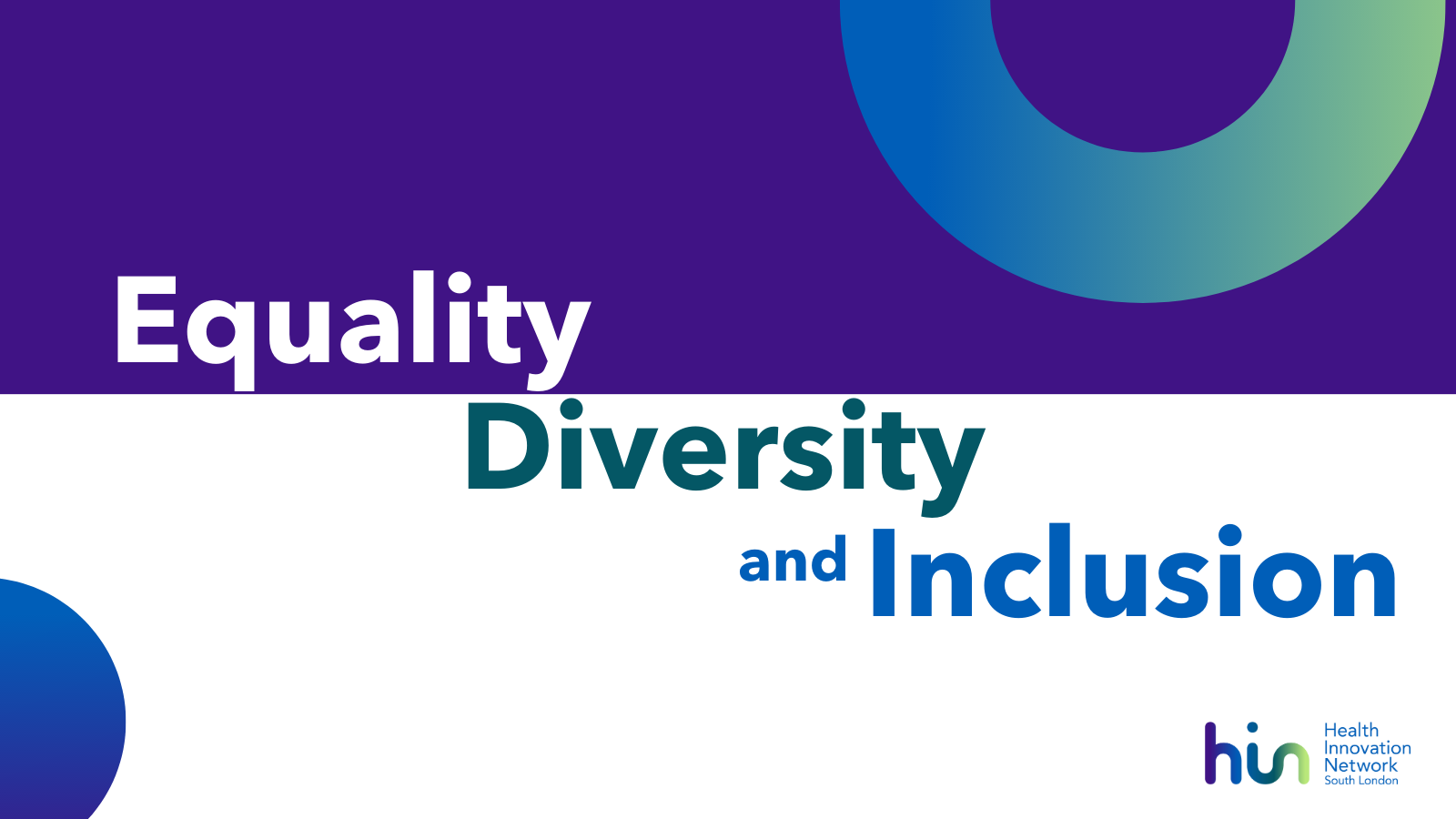
At the Health Innovation Network equality, diversity and inclusion (EDI) is extremely important to us, which is why we have developed a culture that invests in it. Representing the highly diverse area of south London, it’s crucial that we reflect this as much as we can by creating an environment of psychological safety, purpose and belonging. All our inclusion activity is underpinned by sustained engagement, organisational commitment and strategy which engages our staff on how we can all be more inclusive.
This is about making sure the HIN is a great place to work for everyone, and that our projects deliver for the whole community. On this page you can find out about some of the initiatives we have in place to help ensure we do this.
Along with all 15 Academic Health Science Networks (AHSNs) in the AHSN Network, we are committed to a series of pledges to further support the diversity and innovation agenda.
Working at the HIN
We are part of Guy’s and St Thomas’ NHS Foundation Trust (GSTT). The Trust has a number of policies and staff networks aimed at improving diversity and inclusion. You can find out more on GSTT’s Wellbeing and Support and Diversity and Inclusion pages.
Initiatives which are available to HIN colleagues include:
- support for events such as Race Equality Week, Pride month and Black History Month
- support for people going through menopause
- free sanitary products in the office
- flexible working policies
Anti-racism
We aim to be an actively anti-racist organisation.
We strive to be actively anti-racist in our workplace and the work we deliver. We recognise that this takes a sustained and ongoing effort, which is why we have an internal anti-racism advisory group and hold regular discussions with all staff and individual teams on various topics to counter racial prejudice, systemic racism, and the oppression of specific racial groups. We encourage everyone to contribute to these discussions, and consider how they can be actively anti-racist in their own roles. For example:
- London - The team introduced an unconscious bias statement that was utilised by panels before conducting company interviews. This statement aimed to raise awareness about unconscious bias, which refers to biases we are unaware of and that occur beyond our control. By asking interviewers to reflect on and examine their unconscious biases, we strive to ensure that all innovators are provided with equal opportunities and fair decision-making.
- Equality Health Impact Assessment – We have taken proactive measures to address racial and health inequalities within our projects by implementing a mandatory Equality and Health Impact Assessment (EHIA) process. This tool enables us to identify and address any disparities effectively. To ensure its thorough application, we have integrated EHIA into our Project Management Office software, leaving no room for oversight. Consequently, this standardised practice is now an integral part of all our projects.
We also:
- implemented training in identifying and challenging racist or discriminatory behaviour when it occurs;
- run sessions on identifying microaggressions and understanding their impact;
- regularly share resources to help colleagues understand alternate perspectives and the impact of racism.
We aim to ensure racial diversity on all HIN interview panels and support training of colleagues to facilitate this. We developed a top tips guide for managers and global majority and any invited panel member to create the best environment for recruiting new members on to the team.

Disability and Neurodiversity
Equality of opportunity is our policy. We are a disability confident employer. We can make reasonable adjustments and offer support and advice in a variety of ways throughout the application process. For example:
- allowing additional time for assessments
- providing questions in advance
- providing information in accessible formats
- ensuring in-person interviews and assessments are fully accessible
We are also committed to supporting disabled and neurodiverse colleagues by making reasonable workplace adjustments, including:
- Accessible desk setups
- Flexible working
GSTT has a Disability and Dyslexia Network which is open to all HIN staff. The network aims to raise the profile of staff with a disability and provide advice and guidance, in a confidential and safe environment.
Menopause Support
We recognise the importance of supporting staff in their menopause journey in maximising staff wellbeing at work. We offer staff free access to Peppy, an app that provides support for menopause.
Pay equality
In the interests of transparency we publish data on organisational pay, broken down by gender and ethnicity. We have made progress in this area but recognise that there is more to do. You can find out more about pay rates and our progress year-on-year in our Annual Report for 2022/23.
Diversity and Inclusion in our Work
In addition to making sure the HIN is an inclusive place to work, many of the projects we deliver are focused on ensuring equity between groups and addressing health inequalities.
Some examples of how we have done this are below.
HEAL-D (Healthy Eating and Active Lifestyles for Diabetes) aims to address the specific challenges faced by African and Caribbean communities in managing diabetes. It provides accessible and culturally sensitive diabetes education as a priority for these communities. Find out more about HEAL-D.
Addressing Perinatal Health Inequalities for People from Minoritised Communities. We have actively addressed health inequalities faced by women and birthing people from Black, Asian, or mixed ethnic backgrounds during their maternity journey through the Croydon HEARD (Health Equity and Racial Disparity) in Maternity campaign. Find out more about how we have helped address perinatal health inequalities in Croydon.
Access Denied looked at the potential inequalities in providing healthcare services digitally and made a number of recommendations to address these. Find out more about Access Denied.